
Solo world traveller Anna (part 2): ‘I’m in Indonesia and have been for two months after getting stuck on an island’
Discover how solo female traveler and international English teacher, Anna Carrasco Linares, found herself stuck on tropical island in the midst of the coronavirus pandemic.
As global citizens, we face a common threat with the arrival of the coronavirus, however, each of us has a unique story to tell. For most, living on a small remote Indonesian island is a dreamland vision of empyrean during the COVID-19 quarantine. Nonetheless, for twenty nine year old international English teacher Anna, circumstance made it her reality. But how did this happen?
‘24 hours before they closed the boarders, they sent me a message telling me to go back to China, but I’m on a small island in Indonesia and I didn’t have enough time to get back’
Nomadic teachings
Backpacking across continents for the last six years, Anna has been using her craft of teaching English linguistics to open up whole new worlds to young people across the world. Her latest contract took her to China, where she would teach infants at a private Montessori school in Beijing before the coronavirus outbreak.
Reinventing daily life, work and play is something Anna from Barcelona, Spain has refined as an intrepid professional traveller. A new location for every teaching contract means scouting out new amenities and ways to connect with people.
Yet, even with all of her experience, Anna, like so many of us, could not have foreseen how COVID-19 would alter the routes of our lives. In an interview with 21bis, Anna shares her pandemic story so far.
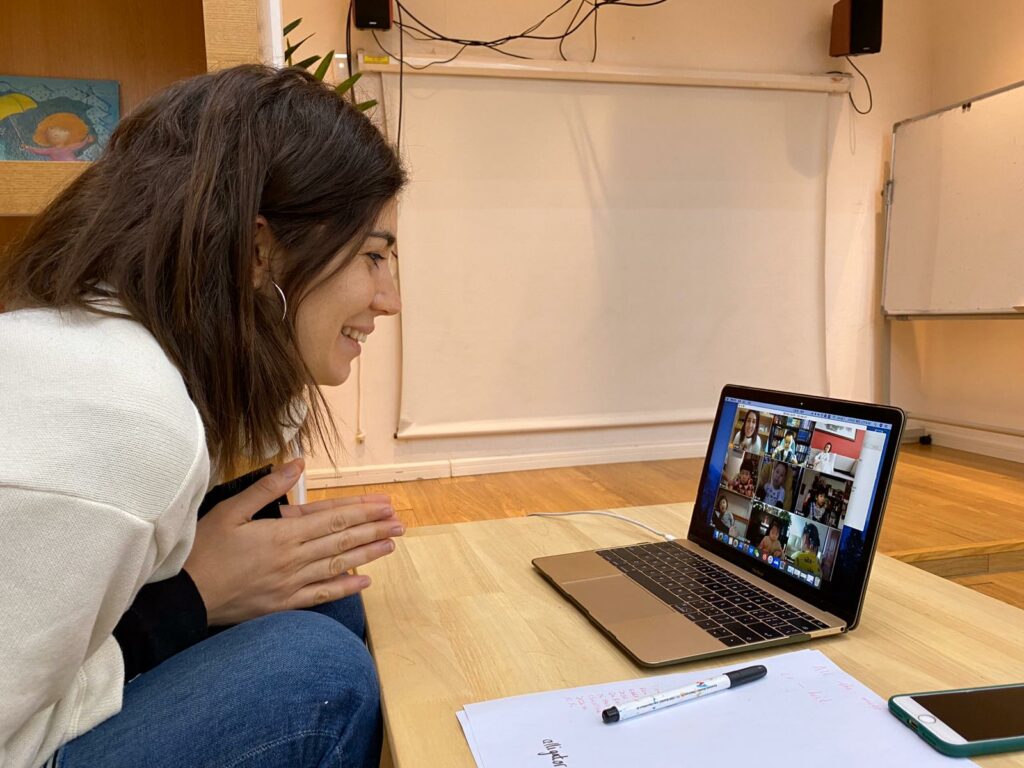
Q – Where are you now?
A – ‘I am currently in Indonesia and have been for two months after getting stuck on Gili Trawangan island. They closed the borders in China and I cannot go back. 24 hours before they closed the border, they sent me a message telling me to go back to China, but I’m on a small island in Indonesia and I didn’t have enough time to get back.
It was 12 am when they contacted me and if I wanted to leave the island I had to leave in the next two hours and there were no boats and it got so difficult. So I’m here waiting until they open the borders again.’
Q – Teaching in China was a dream come true?
A – ‘A few years ago I was teaching in Vietnam. It was one of the best experiences of my life! I was missing Asia a lot and I adore studying languages, so a few years ago, I decided that I wanted to learn Chinese. Last summer, I was in New York working on a project and I loved it. I didn’t want to leave.
But then, I suddenly got a job offer from an Asian agency that was hiring international teachers to teach English in China. In the beginning, I wasn’t sure. Eventually, I decided that because it was one of the things on my do-to list, maybe this was the moment to do it. I started teaching in China in November.’
Q – How did you feel when you found out about the coronavirus outbreak?
A – ‘When I heard the news about the virus, the first day that I heard about it, I couldn’t imagine that it would be that big; that this virus would stop the world. My first reaction was waiting to see what was happening but then I started to see that my teaching colleagues started to get really paranoid and told me I must not to go out because it’s really dangerous. When I did go out, I saw that things were starting to shut down and then I realised that it was getting big.’
Q – Before the virus, what would a day of teaching in China look like for you?
A – ‘On a normal day, I would arrive in the morning and we would usually do twenty five minutes of circle time. Here, we sit down and do the routines in English and talk about the weather, how are we, we sing a few songs and every two weeks I teach some vocabulary. I talk to my group of ten students in English all day. They are all two to three years old and honestly, they understand everything I say to them!
Playground time lasts for at least thirty minutes and we move on to storytime. This consists of having different places around the class and they can pick the activity that they want to do. For example, they can do arts and crafts or go to the English or math corner. We always have five minutes of Chinese language and five minutes of English, so the kids are free to go where they want.’
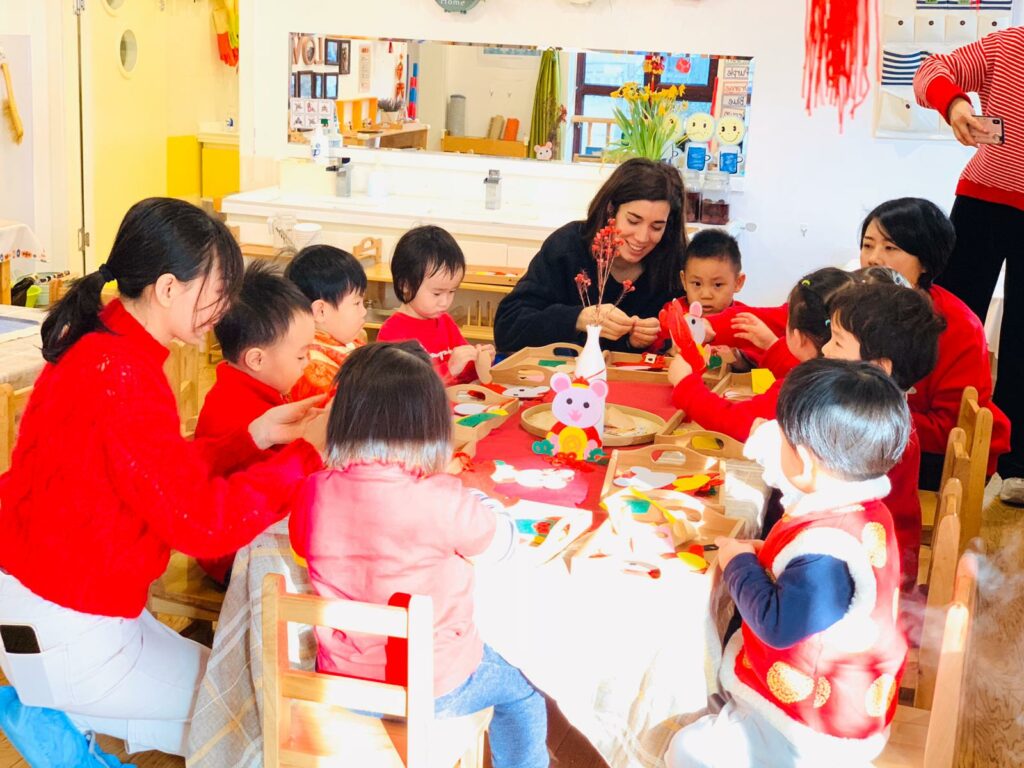
Q – How have you adapted to teaching infants on a digital platform?
A – ‘In the mornings, I teach one hour of English and my colleague takes a Chinese lesson in the afternoon. To begin with, it was a bit difficult with the online method because nobody knew how to do it and the children are really young! Being only two to three years, they cannot concentrate for a long time doing the same thing. This happens in the classroom also but we can change the activities all the time.
The first week was hard but then I got used to it and I made a plan which included playing videos and talking to them between the lessons and then giving them a break of ten minutes to go and drink water.’
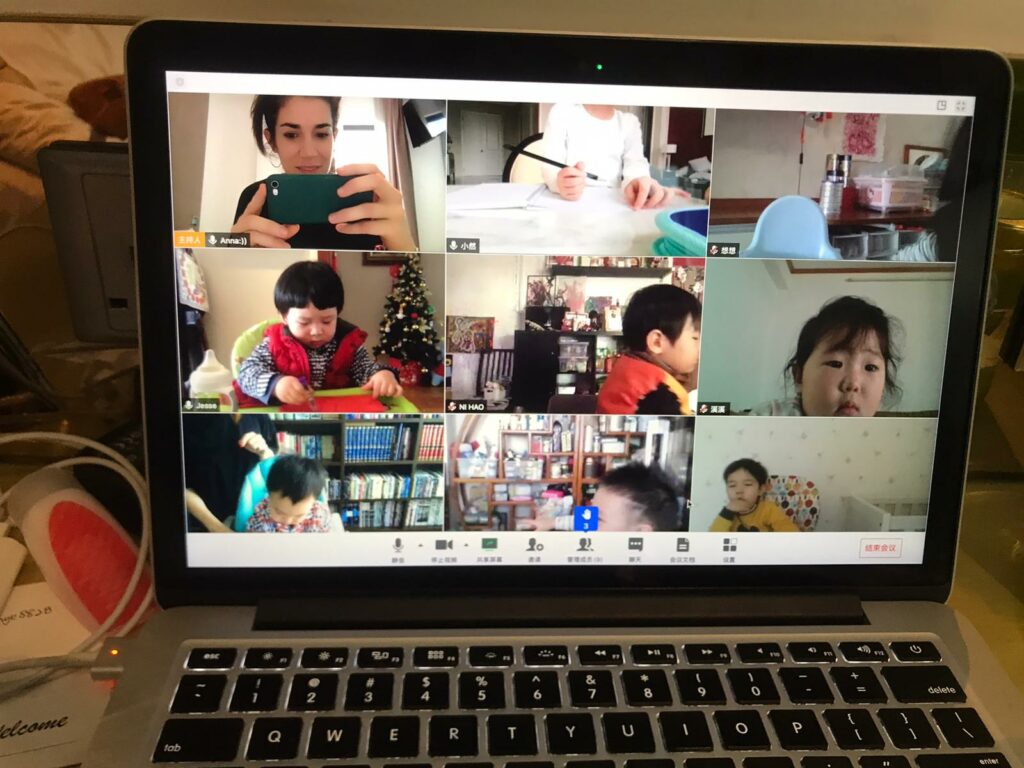
Q – There must have been a lot of pre-online class preparation?
A – ‘I communicated with my colleagues through WeChat, which like a WhatsApp that we use in China. We would video call and talk all the time. We especially spoke a lot at the beginning, as we all had to be super supportive of each other. It was really difficult as nobody knew how to do it.
When the coronavirus started, some of the teachers met in the school even though the government enforced a regulation to prevent people from going to work. But we had to do it to get materials like worksheets and make a plan about what we were going to do. We went to school for three days and prepared everything for the following month. In the beginning, we prepared for one month. But then we saw that the situation would be longer, so we had to prepare new materials.’
Q – Is digital teaching really effective for young students?
A – ‘It is effective in the way that they have the feeling that they are still learning and that they have to go to school and have a schedule to keep learning. I don’t expect them to speak good English after just one hour lesson. I have ten kids and I try to talk to all of them, but it’s not always possible. The effectiveness is more in the way that they understand that we still need to go to school even when this situation happens.
It’s true that I myself, feel a lack of concentration sometimes. You have to remember that their parents are with them and sometimes their grandparents are in the background talking. Or, the kids have their toys around them and they want to show me everything and they all want to talk to me at once. They will say “Anna! Anna! Hello Anna!” Sometimes it’s a little difficult.
What I do now that I didn’t do before, is mute their mics. I will ask a question to just one student and the parents help me by unlocking the mic of their child and help me to explain the question I am asking.’
Q – Don’t the parents find the teaching style a challenge?
A – ‘I think the parents like the teaching style because they are always in the lessons and they look happy. That’s the feeling that I have because they also like to participate. But it is true that at times I have been thinking that they don’t like that their children have to be on a screen for two hours a day. This is something that our montessori school never does. But due to the situation, I think it is the only way and chance we have to keep learning and keep thinking.’
Q – You were able to work, so what made you travel to Indonesia?
A – ‘After one week of the virus, I was becoming really sad because I was new in China. I had only been there for two months so I didn’t know many people. It was such a weird situation because I could see the fear in the eyes of the people. One memory that will stay with me forever is taking the Beijing subway. The subway is always super packed and at that time there was no one. I could not believe it.
In the second week, it got very hard because almost everything was shutting down. At this point, I decided that I needed some help. I was feeling really lonely in China and my family were starting to worried about me. I didn’t want to feel so sad, so I booked a flight and travelled to Indonesia, where my best friend lives.
Being with her has helped me a lot. It is true that I was connected to China all the time and also worrying about everything and everyone that I love there and my students. I was thinking a lot about them and how they would be feeling, but it helped me to have good company and go through this together.’
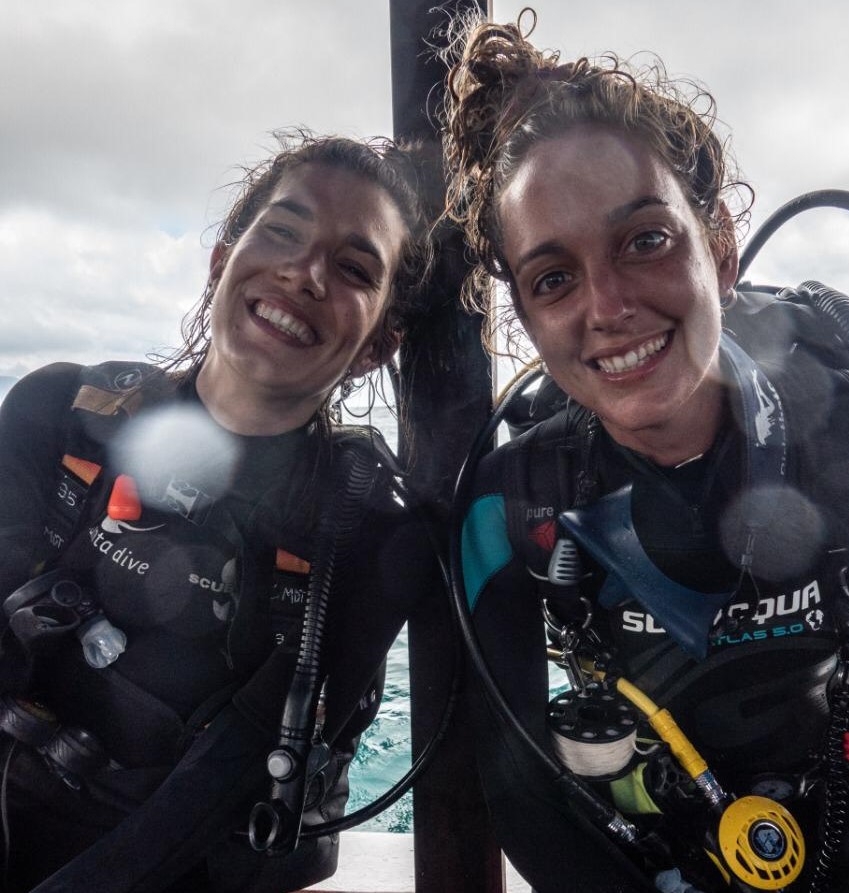
Q – Your friends and family must be concerned about you?
A – ‘At the beginning of the coronavirus, my family got super worried and started to ask me to go back to Spain, but at the same time I didn’t want to go because I felt it was too far. I wanted to be close to China so that I could return at the first moment they could open the school. But honestly, I didn’t think that the situation would go on for this long.’
Q – What about your financial security?
A – ‘It has brought a lot of financial problem to me from the school and it’s been kind of messy. I have been talking a lot to the school and my teaching agency because they wanted us to stop working. They couldn’t pay our wages or work for less money so it’s been tough.’
Q – You wanted to travel after teaching, so how has the virus the affected your plans?
A – ‘At the beginning, it was really tough to accept what was going on because in my mind I planned to be in China for 6 months to live the experience, make some money then travel. Then suddenly I realised that I cannot plan anything because something like this stops everything.
My experience of working in China was cut to two months and economically I was thinking that I would have more. I also came to realise that I don’t have the money I was expecting and needing because the school couldn’t pay us. I had to accept that I couldn’t plan anything.
It also affected me a lot when I realised how much I miss my students. I’m attached to them and it’s hard to see them through a web camera and not being able to talk to them properly. I am also learning Chinese, so it is affecting my process of learning the language. I started to feel that I could not go back to learn, that I had no reason to continue. I have since changed my mind and I feel I want to carry on as it’s just a state of mind.’
Q – Day-to-day life on Gili Trawangan island must be different from what you are used to?
A – ‘During my quarantine on the island, I have been surfing and freediving for the first time and I also connected with painting again. Usually, I start with a yoga class. The island is still in locked-down but apparently there is no virus here, as far as they know. They don’t let anyone enter in case they bring the virus and that’s why they still let us do a few things with people like yoga.
The people here are really aware of the coronavirus and the know that it’s not good to have lots of people in the same place. They always disinfect everything before we arrive at a yoga class and again when we leave.
Last week I started to surf for the first time. It’s something that I have always wanted to do but I never had the time. Before when I visited the island I was more focused on diving, but now because of the situation, we cannot dive.
I have a lot of time so I decided that I would surf and hired a teacher for two days and then started to surf alone. I have to say that when I was with the teacher, it was really good and then when I was alone, it was a little frustrating. I’m going to keep trying at it!
I also started a freediving course! Diving without a tank is something else that I have always wanted to do. Before it was too expensive. The island survives on tourism, so the businesses here are short on money right now and people are aware of this. So they decided to provide courses, like freediving, on a donation basis. It’s something like 12 euros to pay the expenses of the boat.
Something else I have been doing is connecting with painting again and it feels really good. I love it. I used to study art when I was younger and when I finished the studies I stopped painting. It has been 10 years since I have last pained for myself!’
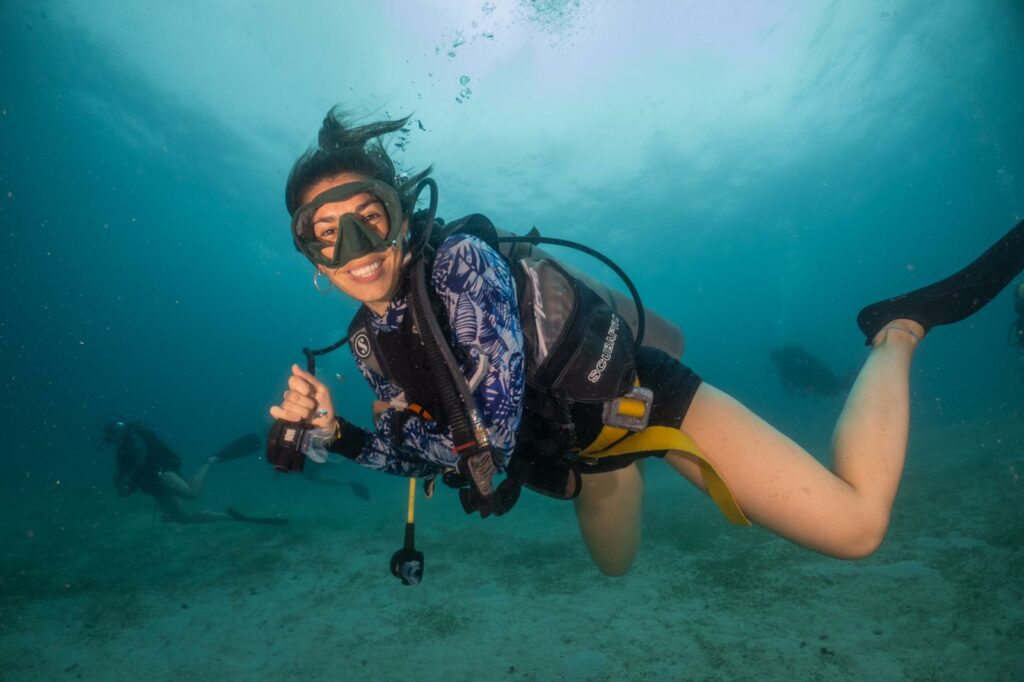
Q – Living on an island must be tough at times?
A – ‘I feel really uncomfortable every time people ask me about my quarantine. I try to avoid explaining everything that I am doing here to certain people. When I talk to my friends from back home they are telling me that they are super desperate and having a really hard time being in lock-down. Sometimes, I’m not able to tell them that I am able to go surfing or that I go freediving, or that I can do morning yoga lessons. That’s my worry, honestly.’
Q – From your experience, what advice would you give to people living in quarantine?
A – ‘My advice would be that you need to accept that you can not control what has happened. Don’t get upset with the world and the system. An important change for me was not listening and reading too much media because things change all the time and you can get really crazy! But it is important to know where to look for reliable information.
Make the most of this time we have for ourselves. Read that book you have wanted to read for a long time. Watch that movie that you have been saving. Try to learn something new. Enjoy the little things. Enjoy the sun, enjoy the rain, enjoy a cup of coffee, a cup of tea. Enjoy spending time with your family, your boyfriend, your girlfriend, all of these things that sometimes in our busy lives we choose not to do.
You will get through it. Listen to what your government tells you to do and following the rules, it is really important. Take care of the ones you love and remember there is always light at the end of the tunnel.’
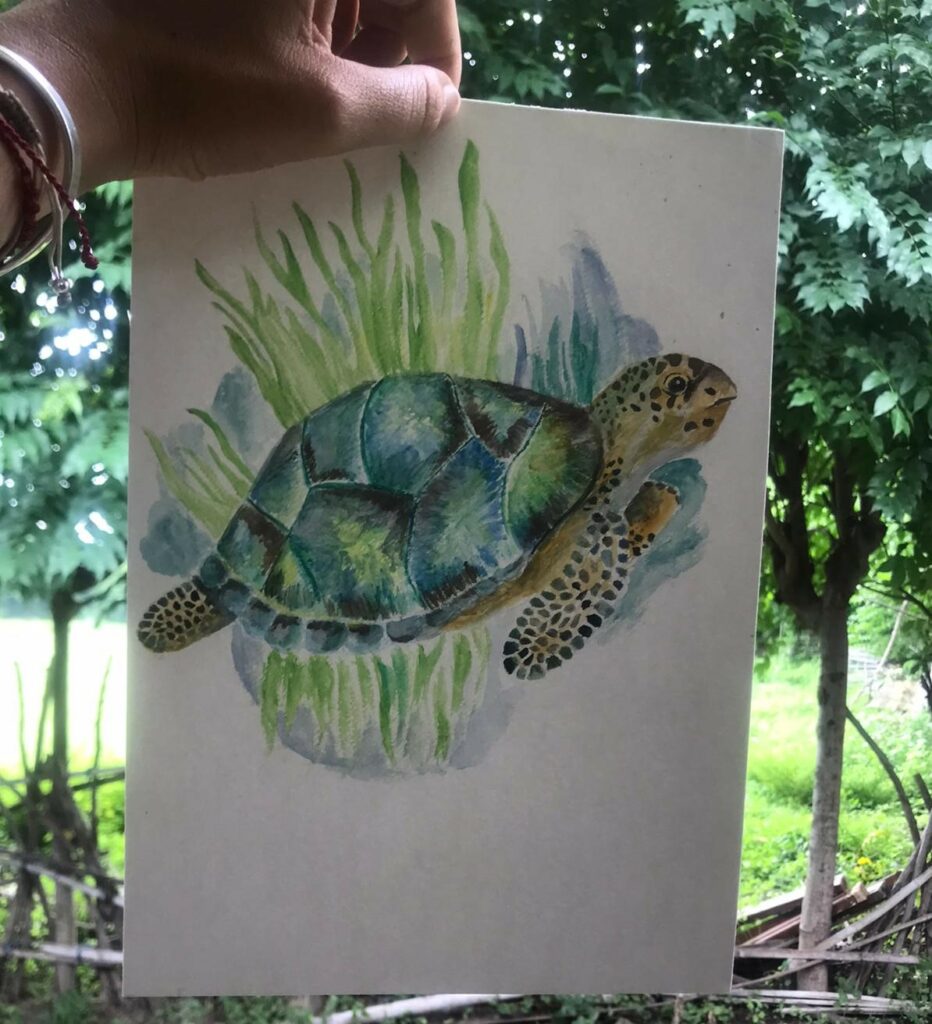 To read more about Anna and her worldly insights click here
To read more about Anna and her worldly insights click here
Text: Sara-Jane Vanstone, pictures and video © Anna Carrasco Linares



